2
October 2002
![]()
2. "Turkish MPs block bid to delay November election", Turkish lawmakers on Tuesday thwarted efforts to cancel November elections by voting for a parliamentary recess until after the poll. The move ended weeks of uncertainty over whether the November 3 elections, largely seen as a way out of a severe government crisis, would go ahead.
3. "Turkish voters propel newcomer's rapid rise"
4. "EU-Commissioner Verheugen: Turkey should remain outside", according the commissioner for enlargement of the European Union (EU), Günter Verheugen, Turkey is not ready at present to apply for the admission into the European Union. Torture and political pursuit are still on the agenda in Turkey, said the commissioner.
5. "EU eyes progress report, election results", It will be in the light of the progress report of the EU council on Turkey and election results that the union will decide on when to open accession talks with Turkey, says an EU minister. (...) "Verheugen: At least AKP is not closed down" - Progress report will underline Turkey's progress.
6. "Clerides: Cyprus passing through most critical phase since 1974", "We are continuing silently to strengthen our defenses in the framework of the joint defense pact with Greece," Clerides said, adding the coming months will be "the most important diplomatic battle of the past 28 years - a battle that will determine the future of this country."
7. "'Avoid giving excuse for war', advises Turkey", Bulent Ecevit, the Turkish prime minister, yesterday warned neighbouring Iraq that it must implement its promise to allow unfettered access to United Nations weapons inspectors to avoid giving Washington an excuse for military action.
8. "Iraqi Kurd leaders to meet, step up peace moves ahead of parliament revival" (...) Aziz says Kurdish plans for Iraqi "federal constitution" are "nonsense".
1. - Kurdish Observer - "ECHR adjourned 'The Case of the Century'":
The European Court of Human Rights (ECHR)adjourned the rule in relation to the case of KADEK President Abdullah Ocalan vs. Turkey to the next year.The rule that has been prepared during summer and expected to be announced on October will be revised according to the new situation. An ECHR official gave information without revealing his name and said "The judges will revise the draft in the light of legal amendments in Turkey
CEMAL UCAR MHA / FRANKFURT / 1 October 2002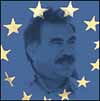
The European Court of Human Rights (ECHR) adjourned the rule in
relation to the "Case of the Century" of KADEK President Abdullah
Ocalan vs. Turkey to the next year. Talking to MHA, ECHR officials related
the reason of the adjournment to the abolishment of capital punishment
in Turkey on August 3.
The rule that has been prepared during summer and expected to be announced on October will be revised according to the new situation. An ECHR official gave information without revealing his name and said "The judges will revise the draft in the light of legal amendments in Turkey." He pointed out that it was a complicated process and abolishment of capital punishment had created a new situation and from now on death sentence was impossible to be executed. The official stated that in case that there would no change and amendments the decision was expected to be announced on January.
Turkey sent a letter to ECHR
The renewal was asked for by Turkey. According to the information received, Turkish Ministry of Justice sent a letter to the ECHR, stating that capital punishment was abolished, therefore informing that there is no death threat against Ocalan. The Ministry asked for the ECHR to omit the article 2 of the European Accord of Human Rights (EAHR) which guarantees the right to life. And the court sent a letter to the lawyers of Ocalan last week, requesting their opinion about the new situation.
Lawyers do not accept it
Ocalan's lawyers, however, do not considering to omit the article 2. And their justification is that there is still threat of capital punishment in Turkey and that the article 2 contains the right to life generally. The lawyers will list the justifications of their objections.
The lawyers remind that there is still a possibility to execution in case of "war and immediate war" and the threat still continues as it can be implement even a new State of Emergency Rule (OHAL).
And Kerim Yildiz, director of Kurdish Human Rights Project (KHRP) in London made a statement to MHA, reminding that the right to life did not only contain death sentence. He emphasized that the capital punishment was not abolished unconditionally, and the right to life of their client was still under threat. On the other hand Ocalan's English lawyer Timothy Otty stated "We are sure that we will win the case."
Background of the case
"The Case of the Century" was accepted by ECHR on November 21, 2000 on the grounds that Turkey had violated the article 12 of EAHR. The lawyers have listed the articles violated by Turkey in their submitted dossier as follows: "article 2 guaranteeing the right to life, article 3 banning the ill-treatment, article 5 in relation to right to freedom and security, article 6 guaranteeing right to fair trial, article 7 banning extra judicial punishment, article 8 preserving right to personal and familial life, article 9 guaranteeing right to thought, article 10 in relation to right to expression, article 13 preserving right to effective investigation, article 14 banning discrimination, article 18 preventing the limitations on the rights and article 34 preserving the right to individual application."
The ECHR found the case acceptable on December 14, 2000.
Ocalan was abdicated from Nairobi, Kenya on February 15, 1999 and delivered
to Turkey. After an unfair trial he was sentenced to death on June 29,
1999 and the rule was approved by the Supreme Court on November 25,
1999. On the other hand the ECHR asked for not executing the capital
punishment by a decision on November 30. And the Turkish government
decided on January 12, 2002 and put the case aside. But after the capital
punishment was abolished, the dossier was sent to the State Security
Court. ![]()
2. - AFP - "Turkish MPs block bid to delay November election":
ANKARA / 1 October 2002 / by Hande Culpan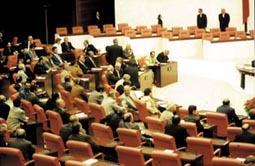
Turkish lawmakers on Tuesday thwarted efforts to cancel November
elections by voting for a parliamentary recess until after the poll.
The move ended weeks of uncertainty over whether the November 3 elections,
largely seen as a way out of a severe government crisis, would go ahead.
Parliament speaker Omer Izgi announced at the end of the ballot, which was conducted by a show of hands, that 191 MPs in the 550-seat house had voted for the recess and 170 against. The vote on the bill to send parliament into immediate recess came only about an hour after legislators had returned from a three-month summer break. MPs seeking to postpone the elections, mostly on fears they will lose their seats, greeted the announcement with cries of protest, saying the ballot was not properly conducted.
They had wanted to keep parliament in session to introduce a bill delaying the November poll. They can still call for an extraordinary session of parliament, but observers suggested this would be an uphill battle in the wake of Tuesday's ballot. "If elections were postponed, there would be great chaos in the country. It would have led to economic and political uncertainty," Abdullah Gul from the opposition Justice and Development Party (AK), the front-runner in current opinion polls, told the NTV news channel.
The election, originally slated to take place in 2004, was brought forward by a majority of MPs this summer because of a political crisis over EU-sought democracy reforms and the ailing health of Prime Minister Bulent Ecevit. But last week, parties which risk losing all their parliamentary seats in the elections and deputies who have not been selected for re-election launched a bid to scrap the poll. They argued that elections should not take place before amending electoral laws to make them more democratic and that Turkey should put off elections to improve its struggling bid to join the European Union until after the bloc's December summit when it will draw out its enlargment calendar.
One of the MPs who was opposing the polls, Gaffar Yakin of the New Turkey Party, told the assembly on Tuesday that the election date had been ill chosen. "We made a mistake. We didn't take into consideration if the election would have a favorable or unfavorable impact on the country," he said to explain his change of heart regarding the polling date. He also said he wanted Ecevit to stay in power to "protect Turkey's interests" in case of a US military intervention against Iraq. But their move attracted fierce criticism from the mainstream press and financial markets, who accused them of manoeuvring to escape an election in which they face falling into oblivion.
Recent opinion polls suggest that the November election
will bring to power the Justice and Development Party (AK), whose moderate
Islamist leader was barred from stading in the poll due to a sedition
conviction. Several mainstream parties, including Ecevit's Democratic
Left Party (DSP) and its centre-right partner, the Motherland Party
(ANAP), are expected to lose all their seats. Besides AK, only the centre-left
Republican People's Party (CHP) is expected to win enough votes to enter
parliament. It is yet unclear whether the remaining parties will be
able to overcome the 10-percent national threshold required to win parliamentary
seats. ![]()
3. - Financial Times - "Turkish voters propel newcomer's rapid rise":
2 October 2002 / by Leyla Boulton 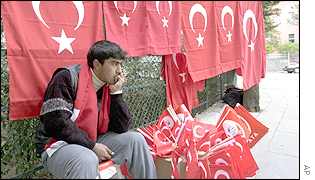
"Do you want to punish thieves . . . Are you fed up with unemployment
and poverty . . . Do you want to be rid of the International Monetary
Fund and its yes men in Turkey?"
A "yes" by a significant minority of Turkey's disenchanted voters lies behind the meteoric political ascent of Cem Uzan, one of Turkey's most controversial businessmen. Hours before parliament confirmed yesterday that early elections would proceed as planned on November 3, a survey commissioned by NTV television gave Mr Uzan's newly established Young party 10 to 13 per cent of the vote. That left the pro-Islamic Justice and Development (Ak) party in the lead, with 30-34 per cent, followed by the left-leaning Republican People's party, with 17-21 per cent.
The same poll, allowing for error, suggested that only one other party among the 20 contenders, the conservative True Path, might cross the 10 per cent threshold for entering parliament. The elections are being held 18 months early in an effort to end political uncertainty triggered by the poor health of Bulent Ecevit, the 77-year-old prime minister.
A strong campaign by Mr Uzan, 42, has been backed by fawning coverage from the two television stations and newspaper owned by his family. He has also offered free meals and pop concerts to boost rally attendance.
His promises include free school books for all primary school children and university places and jobs for all young people. His rhetoric suggests he would be prepared to default on Turkey's large public-sector debt.
"Uzan's attacks on the IMF are like the arsonist blaming the firefighter," said one western banker in Istanbul. And although he is promising to lift the parliamentary immunity of deputies, many educated Turks see such immunity as the biggest prize of all for Mr Uzan. It would offer him protection from charges he is fighting in court for domestic securities violations. It would also complicate a racketeering lawsuit launched in New York by Motorola and Nokia after Telsim, the Uzan-owned mobile operator, defaulted on $2.5bn (€2.53bn) in vendor-financing loans from the companies. Adding insult to injury to Telsim's creditors, Mr Uzan has been sending text messages to all Telsim subscribers urging them to vote for him.
Other Turkish parties, which have been reluctant to reject the IMF's economic lifeline, have so far refrained from any counterattack on Mr Uzan. However, Tarhan Erdem, the pollster who conducted the NTV survey, expressed surprise this week at their silence. Specifically, he argued that Mr Uzan was guilty of unfair competition, for instance by violating an election rule ban on the broadcasting of political propaganda until seven days before election day. He said Uzan media news content amounted to advertising.
In response to such criticism, an official at the high election board, which last week banned Recep Tayyip Erdogan, the Ak party leader, from running on the grounds of inciting religious hatred when he recited a poem in 1998 comparing minarets to bayonets, said it was looking into the matter.
Established parties argue that Mr Uzan's popularity is a fad that will not translate into success at the ballot box. Devlet Bahceli, the leader of the rightwing National Action party (MHP), a coalition partner that in polls falls beneath the 10 per cent threshold, says Turks traditionally do not vote for new parties. But others are less dismissive.
"Cem Uzan's success to date is the best indicator
of the failure of Turkey's political class as a whole," says David
Edgerly, the executive director of Garanti Securities in Istanbul. ![]()
4. - Der Spiegel / Kurdish Media - "EU-Commissioner Verheugen: Turkey should remain outside":
1 October 2002 / Translated by Sirwan Hecî Berko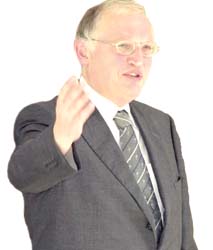
Berlin (KurdishMedia.com) 01 September 2002: According the commissioner
for enlargement of the European Union (EU), Günter Verheugen, Turkey
is not ready at present to apply for the admission into the European
Union. Torture and political pursuit are still on the agenda in Turkey,
said the commissioner.
Verheugen said to the German “Berliner Zeitung" that in Turkey there are still deficits of democracy and human rights. This also shows in the fact that the Turkish election committee excluded the Islamic leader Recep Tayyip Erdogan from the election, which is to take place on 3rd November. Even if it showed progress in the past 18 months, negotiations should be taken up only if Turkey fulfils all political criteria for an entry.
"Human rights organisations say that systematic torture in Turkey has not disappeared, said Verheugen. "It can also not be denied that there are political prisoners."
Verheugen said that Turkey heavily pressures in order to get a date for the negotiations of accession. "Turkey wants to manufacture a situation in which it can say: If we do not get a date, then it means that you do not want us at all ", said the EU commissioner.
Verheugen told this a few days before the publication of the annual progress report on the 13 candidates, which the European Union commission will present on 9th October. Ten candidates - eight countries from Eastern Europe as well as the Mediterranean islands of Cyprus and Malta - fulfil the political and economic criteria for an entry according to his estimate.
Translated from the German Spiegel Online http://www.spiegel.de/politik/ausland/0,1518,216336,00.html
![]()
5. - Turkish Daily News - "EU eyes progress report, election results":
It will be in the light of the progress report of the EU council on Turkey and election results that the union will decide on when to open accession talks with Turkey, says an EU minister
ANKARA / 2 October 2002
The European Union awaits a progress report to be issued on Turkey's
membership performance and outcomes of the Nov. 3 general elections
in Turkey before making up its mind on when Turkey should start accession
talks with the union, said Per Stig Moeller, foreign minister of the
EU's term president Denmark.
The EU Council is due to release progress reports on membership performance of 13 candidate countries on Oct. 9. The union has been negotiating membership terms with 12 candidates and urges Turkey, which now seems to be a distant candidate, to implement a series of political reforms before opening accession talks with it.
Parliament enacted a set of reforms to bring Turkish laws in line with EU standards in August but the EU officials said repeatedly that Turkey should not pin much hope on these reforms to get a date for the beginning of the talks, unless it takes convincing steps to implement them.
Turkish officials, on the other hand, are expecting to receive a date from the union in the Copenhagen summit of EU leaders in December.
Speaking after a meeting of the EU General Affairs Council in Brussels, Moeller said the union was pleased with the reform package approved by Turkish Parliament in August. But the progress report of the EU Council and the outcomes of the Turkish elections will also be taken into consideration, said the Danish minister.
Moeller said the General Affairs Council had been a preparation for the upcoming Brussels meeting of the EU that will discuss enlargement.
The council also took up the Iraqi issue and agreed that Iraq should get rid of its mass destruction weapons. The council members also stated that the United States should act in line with resolutions of the U.N. Security Council.
"Verheugen: At least AKP is not closed down" - Progress report will underline Turkey's progress
Verheugen explained the EU approach to Turkish progress about EU reforms on the Erdogan case. Verheugen stated that the EU is against Erdogan being banned from elections but still welcomes that at least the AKP has not been closed down unlike previous examples.
EU commissioner Gunther Verheugen stated that Turkey made progress but needs to implement fully all the reforms. Verheugen made an example of AKP leader Tayyip Erdogan being banned from elections. Verheugen indicated that banning Erdogan is a bad example but not closing AKP is a good example for democracy developing.
Verheugen who gave an interview to German media Berliner Zeitung newspaper said that the progress that Turkey made, will be determined by the progress report that the commission will declare. Verheugen repeated his previous statement that the criteria to start negotiations are to fulfill political criteria and to implement reforms.
Verheugen made a statement about Erdogan who was banned by the Election High Board from attending elections. Verheugen indicated that the decision sets an example to demonstrate that Turkish democracy does not operate fully.
Verheugen underlined that there is enormous pressure on the commission to give a date to Turkey. Verheugen indicated that if Turkey does not get a date from the Copenhagen summit, Turkey should not understand it as Turkey is not wanted by the EU. "We want Turkey. In the Helsinki summit presidents declared that they want Turkey. This statement is valid until a counter decision is made."
Verheugen indicated that the progressive report which will be declared on Oct. 9 will effect Nov. 3 elections and therefore they will prepare a "modest" report.
Verheugen underlined that EU candidate countries have
to fulfill political criteria and to implement them in order to start
negotiations. Verheugen pointed out that this is not the fact in Turkey.
Verheugen stated that there are still human rights abuses according
to International NGO's and human rights associations. ![]()
6. - Turkish Daily News - "Clerides: Cyprus passing through most critical phase since 1974":
`"We are continuing silently to strengthen our defenses in the framework of the joint defense pact with Greece," Clerides said, adding the coming months will be "the most important diplomatic battle of the past 28 years - a battle that will determine the future of this country."
ANKARA / 2 October 2002
Greek Cypriot leader Glafcos Clerides accused Turkey of resorting
to "threats and blackmail" to block his divided Mediterranean
island's expected accession to the European Union by the end of the
year.
He told his nation in a televised address on the eve of the 42nd independence anniversary that Cyprus was passing through the most critical phase of its history since 1974.
"We are preparing to meet any eventuality," Clerides said referring to Turkish threats to annex the Turkish side of the island if Cyprus joins the EU.
`"We are continuing silently to strengthen our defenses in the framework of the joint defense pact with Greece," he said, adding the coming months will be "the most important diplomatic battle of the past 28 years - a battle that will determine the future of this country."
The east Mediterranean island has been split into the Greek Cypriot-controlled south and the Turkish north since Turkey's campaign in 1974 in the wake of an abortive coup by supporters of union with Greece.
On Monday, Turkey deepened cooperation with its Cypriot ally, allowing Turkish Cypriots to take up Turkish nationality and forming a joint parliamentary committee to look into "integration."
"These ... regulations will help deepen the existing cooperation and solidarity between the two countries," Turkey's Foreign Minister Sukru Sina Gurel said at a signing ceremony.
Clerides' address came a day before he leaves for New York for a meeting with U.N. Secretary-General Kofi Annan and Turkish Cypriot leader Rauf Denktas in an effort to break the deadlock in the U.N.-sponsored reunification talks.
Progress has been blocked by the insistence of Denktas, who is backed by Ankara, on the recognition of his statelet as a first step toward the reunification of the island as a confederation of two independent states.
But such an approach has been ruled out by the Security Council, which has called for Cyprus' reunification as a single state with one Greek and one Turkish Cypriot federal region.
Annan, the United States and the European Union want a breakthrough in the talks before the end of the year to avoid the looming crisis caused by the Turkish threat.
"We are seeking a just and viable settlement that will conform with international law, the Security Council resolutions, international human rights treaties and the relevant judgments of the European Court of Human Rights," Clerides said.
Turkey and Denktas have rejected the U.N. resolutions. Besides reunification, the Security Council also calls for the withdrawal of the Turkish troops.
"My greatest ambition is to see the Cyprus problem solved and Cyprus a member of the European Union," Clerides said.
Cyprus is to be invited to join the EU in its next enlargement, expected from 2004, along with another nine mainly central and eastern European countries.
A settlement is not a precondition to joining, but Brussels will have to negotiate a diplomatic tightrope if the dispute is not resolved before Cyprus becomes a member of the bloc.
EU hopeful Turkey has warned it may "annex" the north if the island joins divided, while EU member Greece, a close ally of the Greek Cypriots, has said it will not ratify enlargement without Cyprus.
Clerides said Cyprus was on the verge of accession, but
cautioned that it should not rest on its laurels. "We are in the
final stretch of a course which will be difficult and very complicated,"
he said. ![]()
7. - The Financial Times - "'Avoid giving excuse for war', advises Turkey":
ANKARA / 2 October 2002 / by Leyla Boulton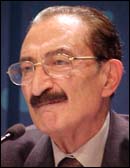
Bulent Ecevit, the Turkish prime minister, yesterday warned neighbouring
Iraq that it must implement its promise to allow unfettered access to
United Nations weapons inspectors to avoid giving Washington an excuse
for military action.
Speaking after meeting Tariq Aziz, the Iraqi deputy prime minister, Mr Ecevit said the "important thing from now on" was how this pledge was carried out.
"The Baghdad administration must not give anyone an opportunity," said Mr Ecevit, speaking as UN and Iraqi officials met in Vienna to discuss the resumption of arms inspections.
Turkey, a staunch US ally and Nato member, has many reasons to avoid a war next door. It fears damage to a fragile economy which relies heavily on tourism. It also wants to avoid an influx of refugees.
Citing up to $30bn (£19.3bn) in economic losses from UN sanctions imposed on Iraq after the Gulf war, Ankara has demanded international compensation in the event of war.
Ankara also fears a stirring of separatist longings among its large Kurdish community if Iraqi Kurds were to gain further autonomy or an independent state as a result of a US "regime change" effort in Baghdad.
In a newspaper interview yesterday, Mr Ecevit, who faces an election on November 3, stressed that the Iraqis should be given a chance to prove their sincerity.
All political parties in Turkey, which would be asked to give the US access to military bases in the event of an attack, publicly oppose US military action to oust Saddam Hussein, the Iraqi president. The Incirlik air base already hosts US and British forces which police the no-fly zone in northern Iraq.
Mr Aziz, on the second and final day of talks in Ankara to try to dissuade Turkish leaders from backing a US attack, yesterday warned that "an attack on Iraq would not only harm Iraq but would pave the way for serious harm to Turkey".
Asked if he would still consider Turkey a friend if it allowed Turkish bases to be used for an attack on Iraq, Mr Aziz said: "No, absolutely not."
However, he said both countries saw eye-to-eye on the
dangers of Washington's policy on Iraq. "We, whether we are in
Ankara or Baghdad, believe the threat against Iraq is at the same time
a threat against Turkey." ![]()
8. - AFP - "Iraqi Kurd leaders to meet, step up peace moves ahead of parliament revival":
ARBIL/ Iraq / 1 October 2002
Leaders of the two main Kurdish factions sharing control of northern
Iraq have agreed to meet and press ahead with further steps to normalize
ties ahead of the revival of a regional parliament this week, officials
said Tuesday. Massoud Barzani, head of the Kurdistan Democratic Party
(KDP), and Patriotic Union of Kurdistan (PUK) leader Jalal Talabani
are to meet Wednesday in PUK-held Suleimaniya, officials from the two
factions said. It will be Barzani's first visit to Suleimaniya for several
years and he will be accompanied by a high-level KDP political bureau
delegation. 
Meanwhile, residents returning from government-held areas say government
forces have stepped up controls at crossings to the Kurdish enclave,
apparently in preparation for blocking access to the area when the Kurdish
parliament convenes Friday for the first time in six years. The meeting
of the assembly would crown reconciliation moves between the KDP and
PUK. During meetings of two of four joint committees set up under a
September 8 peace accord between Barzani and Talabani, the two sides
each agreed to allow the reopening of the rival's offices in their areas
within a week of parliament reconvening, the officials said.
They also agreed to restore property seized in fighting between the two factions, facilitate the movement of citizens across their respective areas, and release detainees still held since the armed clashes which reached a peak in 1996. The officials did not give figures, but said the number of those still in detention from the KDP-PUK conflict that cost more than 3,000 lives was "not large". The committees met in Suleimaniya on Sunday and Monday. The two parties last week drew up a draft constitution for a future "Iraqi federal republic" which they will present to the parliament for approval when it meets in KDP-controlled Arbil. They also agreed on a draft constitution for their Western-protected autonomous enclave, which has been off-limits to the Baghdad government since the end of the 1991 Gulf War.
The KDP holds 51 seats in the regional parliament and the PUK 49, while five seats are reserved for Christian Assyrians. The parliament, elected in 1992, has not convened with all its members since 1996. Under the September 8 accord, which is designed to complete implementation of a US-brokered 1998 peace deal between the two factions, the speakership of the assembly will rotate between the KDP and PUK every three months. The parliament is expected to set a date for fresh elections within five months of its revival, which comes amid US threats to take military action to oust Iraqi President Saddam Hussein.
Aziz says Kurdish plans for Iraqi "federal constitution" are "nonsense"
ANKARA / 2 October 2002
Iraqi Deputy Prime Minister Tareq Aziz on Wednesday dismissed as "nonsense" proposals by Kurdish groups in the north of the country for recognition of their autonomous enclave within the framework of an Iraqi "federal republic".
"It's nonsense what they are doing...There is a constitution in Iraq and it is up to the Iraqi people to draw a constitution if necessary," Aziz told a press conference here after official talks with Turkish officials. "We are waiting for them to come to their senses and to cooperate with the Iraqi administration," he added. The two main Kurdish factions running northern Iraq last week drew up two draft constitutions which they will submit to their regional parliament which is due to convene Friday for the first time in six years.
The draft constitutional plans were worked out by representatives of Massoud Barzani's Kurdistan Democratic Party (KDP) and Jalal Talabani's Patriotic Union of Kurdistan (PUK), two previously warring factions which have recently sought unite and spearhead Iraqi opposition groups. Draft proposals envisage a future federation made up of an Arab region and a Kurdish region.
Much of northern Iraq, which has been outside Baghdad's
control since the 1991 Gulf War, currently enjoys protection afforded
by a US and British-enforced "no fly" zone. The Kurdish proposals
have also attracted criticism from Turkey which is concerned that the
KDP and the PUK could move towards independence if the United States
ousts the Baghdad regime. Turkey says a Kurdish state on its doorstep
would be unacceptable and fears such a move could rekindle a Kurdish
rebellion in its southeastern region. ![]()